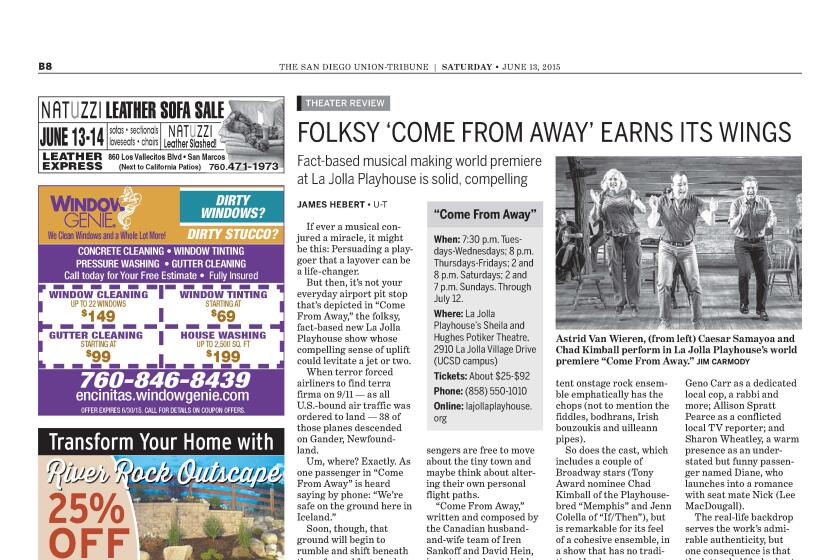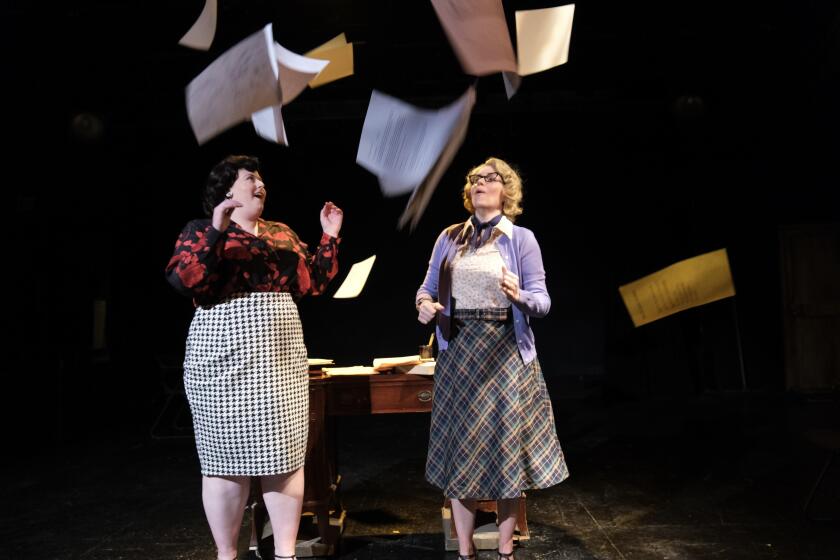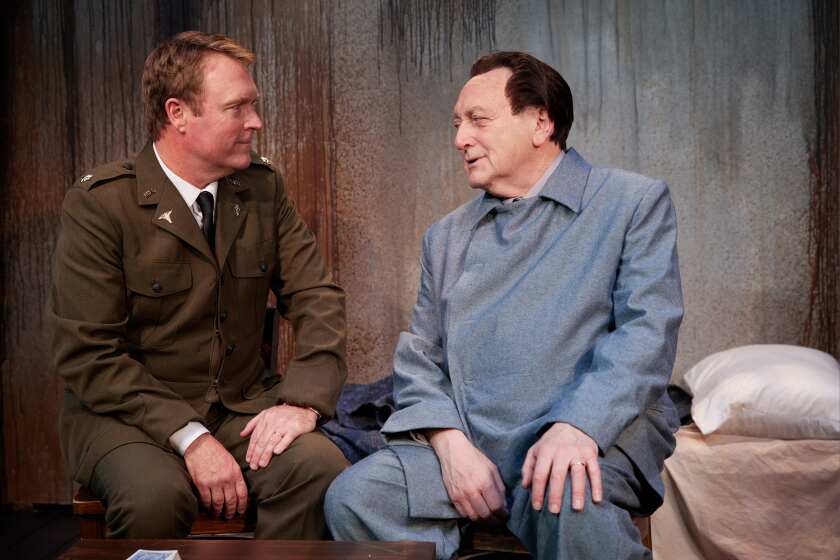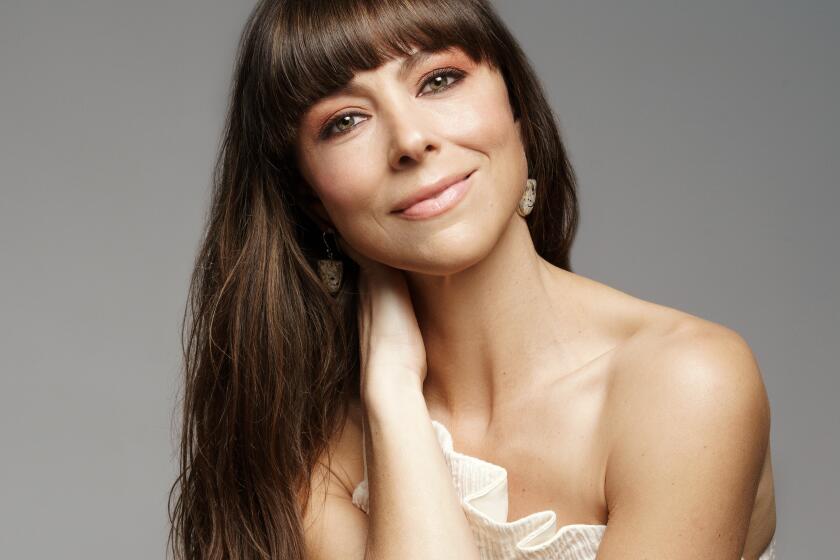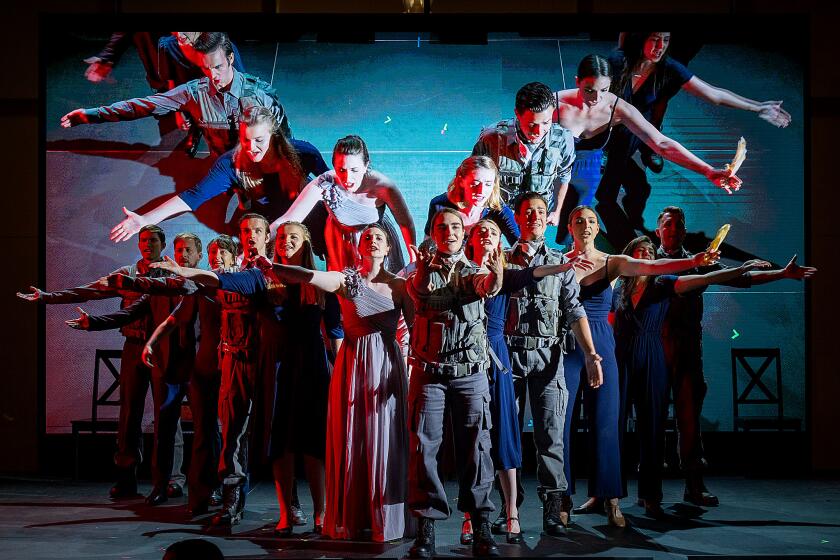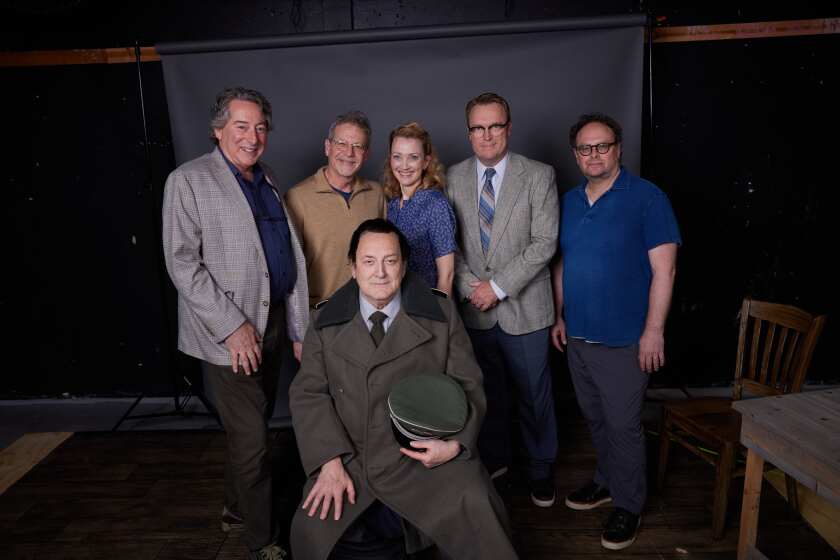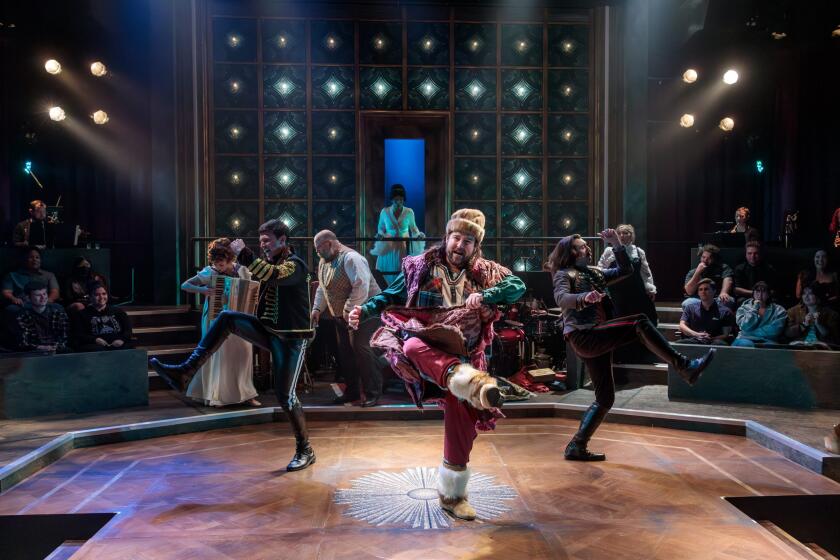Review: Globe’s ‘Richard II’ a gripping exploration of power and its complications
It’s been some week for Will Shakespeare, what with the uproar surrounding the Public Theater’s Trump-ian depiction of Julius Caesar in the play about the ill-fated Roman.
So maybe it’s important to note that the Old Globe’s potent new production of the Bard’s “King Richard II” — another piece about a doomed leader — includes no long red neckties or fashion-model wives.
What it does showcase very effectively is the story of a rash, fickle and disconnected ruler who’s surrounded by “a thousand flatterers” (in the words of one passionate foe), and who squanders both political and public capital as he frets about threats to his power.
As always with Shakespeare, we can perceive parallels with our own place and time, or take his tales as eternally wise meditations on human nature. (Or both. Do with Will what you will.)
What’s hard to dispute is that power — how it’s acquired, who deserves it, how to pass it on properly — is at the center of “Richard II.” The word, in fact, pops up in the play nearly 20 times.
And in the Globe’s Shakespeare Festival staging, director Erica Schmidt does a masterful job of teasing out that theme as she traces the downfall of Richard, the enigmatic figure who was crowned at age 10 and — at least as the play opens, in the twilight of his late-14th-century reign — seems barely to have matured since.
She also has cast a capable Richard in Robert Sean Leonard, the stage and screen star (“House,” “Dead Poets Society,” a Tony Award-winner for “The Invention of Love”) who brings a wry touch and a sense of slow awakening to the character.
The New York-based Schmidt, who first met Leonard when she was a San Diego teen-ager and he was a young actor appearing in the Globe’s “King Lear,” has wanted to direct him in “Richard II” for years.
And while his offhand, almost blasé take on the king is slightly jarring at first — particularly as Richard’s first scene takes place while the corpse of the Duke of Gloucester lies bound, bloodied and beheaded onstage — it makes sense as we learn how insulated (or willfully ignorant) he’s been of the struggles outside the castle.
Leonard is particularly good at pacing Richard’s hard-earned evolution of the soul, punctuating his performance with flashes of revelation. When he finally delivers the famous speech that includes the words, “Let us sit upon the ground / And tell sad stories of the death of kings,” his humbled posture and quiet voice speak to the spiritual journey of a once-haughty monarch.
And this absorbing show, which pitches kin against kin (and king against king) for the fate of a country, likewise draws us deeply into the drama of how past grievances and conflicting visions for the future will be reconciled.
The darkly poetic show is full of punchy turns, beginning with that of Tory Kittles, a self-assured and regal figure as Henry Bolingbroke, Richard’s cousin and rising rival and the man who would (and soon will be) king.
Globe returnee Patrick Kerr brings humor and heartbreak as the principled and perpetually exasperated Duke of York, whose own family becomes split in two over the Richard/Henry faceoff.
And speaking of Globe homecomings: It’s heartening to see Charles Janasz, a onetime staple of the Shakespeare fest, back onstage again — and in such an arresting performance as Bolingbroke’s father, John of Gaunt.
Janasz instantly ratchets up the play’s stakes with his delivery of a withering broadside against Richard, in which he charges (among many other things) that England under his rule “hath made a shameful conquest of itself.”
(When Gaunt dies moments later, the seemingly unperturbed Richard’s response is: “So much for that.”)
The ever-shifting portals of power are echoed in John Lee Beatty’s towering and inventive set, fitted with 21 (count ‘em!) working pentagonal doors that reveal tableaux of servants, foes and sycophants.
Andrea Lauer’s fetching variety of costumes are complemented by Stephen Strawbridge’s rich lighting and Sten Severson’s often haunting musical soundscape. And moments of humor bring sweet relief — as in one scene where the issuance of a macho challenge inspires a fusillade of flying gloves.
That moment underscores how male-dominated a play this is, although Nora Carroll as Queen Isabel and Lizbeth Mackay as the Duchess of York both have strong scenes in the most prominent female roles. (Carroll is part of the versatile corps of student actors from the Old Globe/University of San Diego Shiley Graduate Theatre Program.)
Throughout, the actors and Schmidt — who makes one textual change to put Richard’s life in the hands of York’s son Aumerle (Jake Horowitz) — inject a strong feel that these characters are spontaneously finding their words. It’s a seeming corollary to the idea of a country awakening to the dangers it faces.
And ironically, it’s most true of all for Richard — who, even as he loses his crown (and ultimately more), gains a sense of self. If a little too late.
Sitting in prison, clad not in ermine but in a simple peasant’s robe, he laments: “I wasted time, and now time doth waste me.”
‘King Richard II’
When:8 p.m. Tuesdays-Sundays. (No performance July 4; additional performance at 8 p.m. July 3.) Through July 15.
Where: Old Globe’s Lowell Davies Festival Theatre, Balboa Park.
Tickets: $29 and up
Phone: (619) 234-5623
Online: theoldglobe.org
Twitter: @jimhebert
Get U-T Arts & Culture on Thursdays
A San Diego insider’s look at what talented artists are bringing to the stage, screen, galleries and more.
You may occasionally receive promotional content from the San Diego Union-Tribune.

